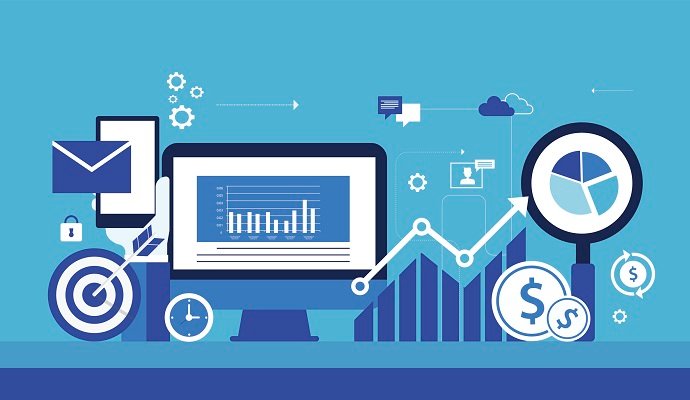What is the Impact of Big Data on Businesses?

The term ‘big data’ is often used in relation to business and technology, but what does it actually mean? Big data refers to the large volume of data that organizations now have at their disposal. This data comes from a variety of sources, including social media, sensors, websites, and transactions.
Organizations are able to use big data to gain insights into customer behavior, understand trends, and make better decisions. Big data is becoming increasingly important to businesses as they look to gain a competitive edge by optimizing operations and creating new products and services. While you can make use of available digital analytics tools, the hard skills of data analytics are important to help extract valuable insights from big data.
Analytical skills have now become a core skill required by many industries. Industries such as financial services, retail, and telecommunications are all capitalizing on big data to drive efficiency and improve the customer experience. You can acquaint yourself with these by enrolling at Aston University for an online business analytics degree. The degree provides a strong foundation in statistical methods, computer science, and communication. The coursework emphasizes hands-on learning and real-world applications. This will help you develop the skills and knowledge that will help you stay ahead of the competition.
There is no doubt that big data is having a big impact on businesses around the world. But what exactly is this impact? And how is big data being used by businesses to improve their operations and bottom line? Here are some business problems that data analytics solves.
Healthcare: improving patient outcomes and simplifying logistics

The healthcare industry is at the forefront of big data analytics. When dealing with the complexities of patients and their health, many things need to be accounted for – from clinical expertise to operational processes. However, clinical and operational data often comprise separate systems, making it difficult for healthcare professionals to gain insights from one source without relying on another system.
Big data allows for the integration of clinical and operational data. This is done by breaking down the silos between data sources so that all information can be viewed, analyzed, and acted upon in real-time. This means that healthcare professionals can gain insights into more aspects of patient care and make more informed decisions.
Healthcare organizations are also using analytics to gain insights into the complex interactions between patients, providers, and health systems – such as those related to diagnosis, treatment outcomes, and quality care – to improve patient outcomes and simplify healthcare logistics.
Manufacturing: improving quality control and process efficiency

Manufacturing processes are complex and involve a variety of different business functions. There are multiple steps and many things that can go wrong. Most manufacturers have no way of knowing what caused an issue or error to occur until it has already happened. This makes it difficult to identify the root cause and prevent problems from happening in the future.
Big data analytics can help by aggregating data across various functions, allowing manufacturers to diagnose problems in real-time and make changes that will prevent similar issues from occurring again. This can also help manufacturers better understand the root cause of problems, allowing them to eliminate waste through improved process efficiency.
Read More: The Benefits of Big Data in Digital Marketing
Finance industry: reducing fraud

The finance industry has many different things to keep track of, such as individual financial transactions and accounts. These are being run through complex systems that involve multiple departments and employees, which makes it difficult to make decisions based on complete information.
Aggregation of financial data allows for the comparison of variances to be made between similar types of transactions. This is important for identifying fraud in real-time, which means that the risk of fraud can be decreased or eliminated entirely.
Big data also allows for the analysis of abnormal transactions that fall outside of typical patterns. These can be flagged for further investigation to determine if they are fraudulent.
Retail and commerce: improving customer experience and increasing shopping habits

Information related to customers is often spread across multiple systems and departments, making it difficult to analyze the information in a cohesive manner. Big data allows retailers to integrate customer data from various sources, which enables retailers to gain insights into customer behavior.
Many retail companies are using analytics to improve customer service, productivity, and overall product quality. Big data is used to gain insights into customers’ buying habits and purchasing behaviors. This allows retailers to improve service, enhance product offerings, and increase the likelihood that customers will revisit the store.
Data analytics also allow for improvements in customer experience through fulfilling customer needs. Analysis can uncover what customers are looking for and how to improve the shopping experience for those customers. It can also help retailers gather insights into the habits of repeat customers, which can help them engage with these customers more effectively.
Logistics: increasing efficiency and monitoring performance

When it comes to logistics and supply chain management, there are a lot of different things that need to be accounted for. For example, inventory needs to be monitored and ordered correctly. The logistics industry needs to track the various locations of shipments, which involve multiple carriers throughout the supply chain. Data analytics can help by establishing complete and accurate data about these shipments so that there can be an accurate view of what is needed at each point along the way.
Big data is also used to improve product delivery time. By analyzing customer buying habits, logistics companies can determine which delivery methods to use for certain products and from specific store locations. This allows companies to plan their route better and optimize delivery time.
Read More: 4 Ways Your Small Business Can Benefit From Blockchain
Final thoughts
Big data is still a relatively new concept, but it is clear that it will continue to play an essential role in the future of many different industries. The ability to view a wide range of data in real-time, allowing organizations to see all aspects of an issue or problem from a single point of view, is just one example of the possibilities that big data offers.
Data analytics has been able to improve many aspects of business and corporate operations. It can be used to detect anomalies in a process or product, which enhances improvements or optimizations. It can also be used to establish correlations between various data sources and allows for the creation of more intelligent decision-making methods that can reduce waste in your organization.












One Comment